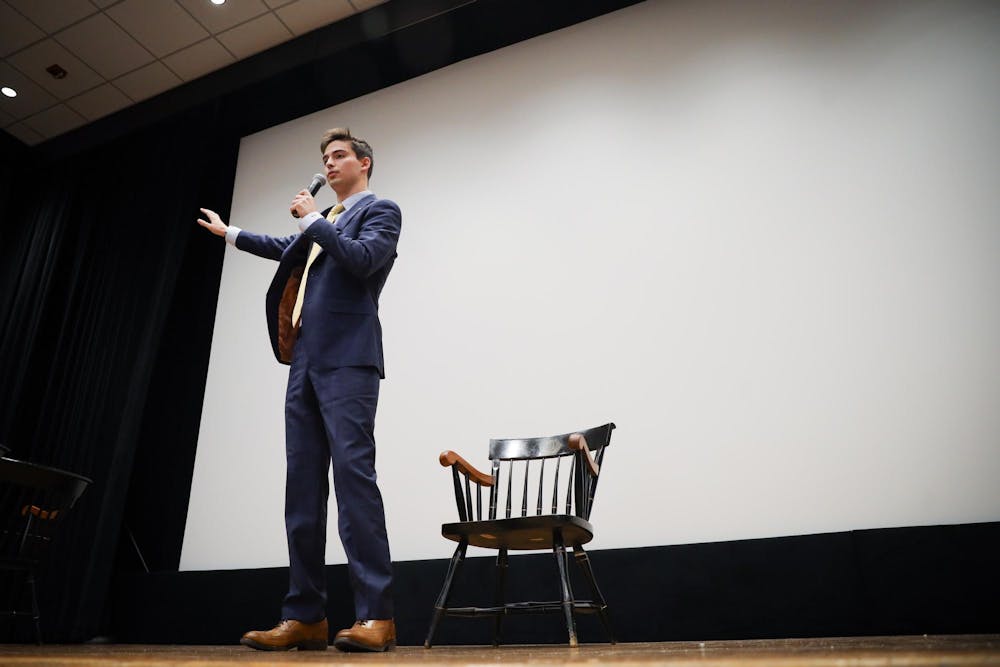The candidates for student body president, vice president, speaker of the senate and treasurer sat down to discuss their campaign platforms and goals for their terms.
But one thing that is unique about this election is each member is running unopposed.
This factor transformed the debate into more of a panel for each candidate to voice their ideas for their potential terms. But some of the most pressing questions were brushed over and not thoroughly addressed.
Student Government funds
One of the most pressing matters concerning Student Government is its inability to manage funds properly, resulting in running out of money to allocate to student organizations for the second year in a row.
"I don't think Student Government has really let student orgs down," sole treasurer candidate Jacob Vaught said.

The treasurer candidate did not adequately describe how Student Government incorrectly allocated funds, and instead chalked it up to inflation and an increase in student organizations.
Vaught claimed that the issue was inevitable, and the only way Student Government could have solved it was by “severely cutting the number of events happening on campus.” His plans, if elected, include pushing organizations to have more events on campus, doing less costly activities and finding different sources of funding.
While the topic of funds could be sensitive for the treasurer to talk about, it is serious. Vaught should have gone more in-depth about how he plans to correct Student Government’s mistake last term and ensure they do not run out of funds for the third year in a row.
Patton Byars on Wi-Fi and housing issues
Students at USC are all too familiar with the poor Wi-Fi quality on campus. The recent housing shortage has created a lot of issues for continuing students who wish to live on campus next year. And while Patton Byars, the sole candidate for student body president, has made these issues his focus, he failed to address them in depth during the debate.
Byars spoke on how he plans to foster positive relationships with administration and faculty. He did not, however, actually lay out his plans to fix these issues.
Having positive relationships with the administration is indeed the first step in making big changes, as Byars stated in his answer, but that should not have been the entirety of his response.
As the sole candidate, Byars needs to be transparent with his plans for the student body, especially when it involves two of the most pressing issues circulating campus. There should be clear, outlined steps on how the Wi-Fi quality will be improved and how upperclassmen can feel secure in their housing options.
How will candidates hold themselves accountable for the campaign promises made?
All of the Student Government candidates have made various promises during their campaigns, but the question is what will they do to ensure these promises are fulfilled.
Byars did not have a thorough response nor did he answer the question completely.
Instead of laying out steps on how to hold himself and the other candidates accountable, he answered with fluff.
"(We will) create a positive culture internally, but also we're advocating. And I think a large part of that is getting to know everyone in Student Government, but also making sure to lead by example," Byars said.
If Byars’ campaign centers around how Wi-Fi and housing problems need to be solved, then he needs to explicitly state how he will solve them.
Fulfilling promises made during campaigns is an important duty of being elected. If the candidates are making these promises, they should be transparent with their plan to fulfill them so that students know they are voting for someone trustworthy.
The Student Government candidates are already facing scrutiny for their lack of opponents, and the fact they are running unopposed could be the reason why they did not thoroughly go in-depth with their responses at tonight’s debate.
But just because their spots are seemingly sealed does not mean they can gloss over important issues that affect the student body.

